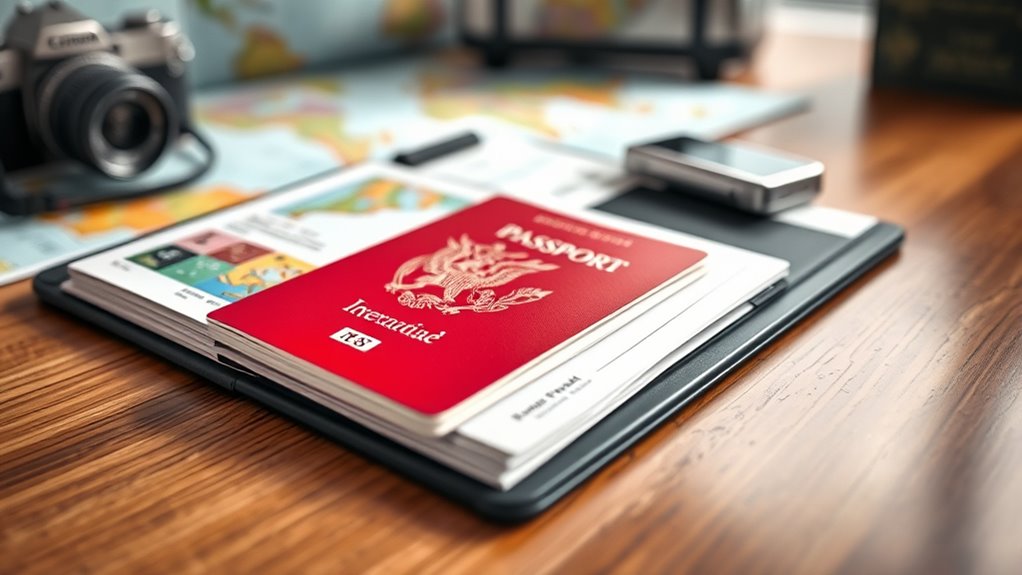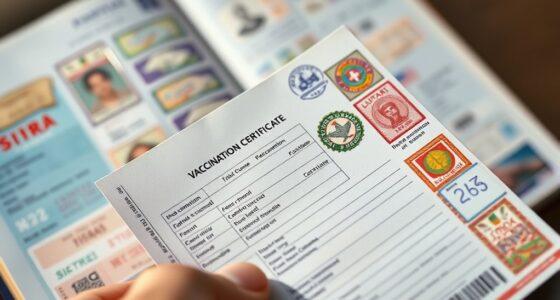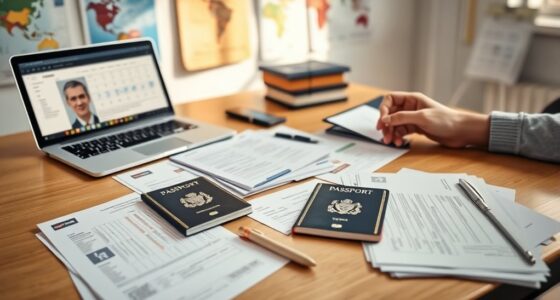Make sure your passport is valid well beyond your planned return, ideally six months, and renew it early if needed. Research visa requirements and start the application process ahead of time to avoid delays. Keep copies of all important documents, both digital and physical, stored securely, and organize them for quick access. Stay aware of expiration dates and processing times to prevent last-minute issues. For more detailed tips, keep going—you’ll find ways to make your move smoother.
Key Takeaways
- Keep passports valid for at least six months beyond your planned return date.
- Research and start visa applications early to meet processing times and avoid delays.
- Make digital and physical copies of all important documents and store them securely.
- Monitor expiration dates and renew passports or visas well before travel deadlines.
- Utilize online resources and expatriate support networks for guidance on document requirements.

Moving abroad can be exciting, but managing your travel documents is essential to avoid unnecessary headaches. One of the most important steps is ensuring your passport is up to date. Passport renewal should be a priority before you leave your home country, especially if your current passport is nearing its expiration date. Many countries require that your passport be valid for at least six months beyond your planned return date. If your passport is expired or close to expiring, renew it well in advance. This process can take weeks, so don’t wait until the last minute. Check your country’s passport renewal procedures, gather the necessary documents, and apply early to prevent delays that could jeopardize your travel plans.
Alongside your passport, you’ll need to think about visa requirements for your destination country. A visa application can be a complex process, often involving multiple steps and documents. Some countries require visas for short visits, work, or long-term stays, so it’s important to research the specific entry requirements early. Starting your visa application early gives you ample time to gather supporting documents, fill out forms correctly, and schedule any interviews if needed. Keep track of expiration dates and any visa validity periods to avoid overstaying or facing entry refusals. Many countries have online portals where you can submit your visa application, but in some cases, you may need to visit the embassy or consulate. Be vigilant about deadlines and required documentation to prevent delays that could disrupt your plans.
Managing these documents also involves making copies and storing digital versions securely. In case of loss or theft, having backup copies of your passport, visa, and other identification can save you significant trouble. Some expats find it helpful to scan their documents and upload them to a secure cloud storage service, accessible from anywhere. Always keep your physical copies in a safe but accessible place, especially when traveling or moving to a new country. Staying organized with your travel documents not only streamlines your entry and exit processes but also provides peace of mind during your move abroad. Additionally, being aware of amazing life together resources and support networks can help you navigate any unforeseen issues that arise during your move. Remember, proactive planning with your passport renewal and visa application efforts is key to making your move smooth and stress-free.
Frequently Asked Questions
How Often Should Expats Update Their Travel Documents?
You should update your travel documents regularly to avoid issues. Typically, renew your passport before it expires—ideally, at least six months before the document validity ends. Check your passport’s expiration date often, especially before traveling. Keeping your passport current guarantees smooth travel and avoids potential problems with visa applications or border crossings. Regular renewal helps you stay prepared and avoids last-minute rushes or travel disruptions.
Are Digital Copies of Documents Legally Sufficient Abroad?
You might think digital copies are enough, but their digital document authenticity varies by country. While many places accept scanned or photocopied documents, some require notarization to verify authenticity. Always check local regulations, as notarization requirements guarantee your digital copies hold legal weight. Keep digital backups, but carry original documents when possible, as relying solely on digital versions could lead to issues if authorities question their validity.
What Should I Do if My Travel Document Is Lost or Stolen?
If your travel document is lost or stolen, act quickly by reporting the incident to local authorities and your embassy. Follow emergency procedures to get a replacement, which may include filling out forms and providing identification. Keep copies of your lost documentation if possible, and stay informed about the process. Your embassy can guide you through obtaining emergency travel documents, ensuring you can continue your journey safely.
Can I Travel With an Expired Passport Temporarily?
You wonder if you can travel with an expired passport temporarily, like holding onto a fading photograph. The answer depends on your destination and circumstances. Some countries allow emergency travel with an expired passport, but most require a valid one. To avoid complications, prioritize passport renewal or seek emergency travel documents. Acting quickly guarantees your plans stay on track, turning a potential obstacle into a manageable hurdle for your journey ahead.
How Do Visa Requirements Differ for Long-Term vs. Short-Term Stays?
When considering visa requirements, you’ll notice that visa duration and documentation validity vary for long-term versus short-term stays. For short-term visits, visas often have shorter durations and less strict documentation validity, making travel simpler. Long-term stays require longer visa durations and more extensive documentation validity, such as proof of financial stability or health insurance. Always check the specific country’s requirements to guarantee your visa covers your intended stay length.
Conclusion
Staying organized with your travel documents is key to a smooth expat experience. Remember, over 60% of expats have faced travel delays due to missing or incorrect documents, so double-check everything before you go. Keep digital copies and store them securely. With these tips, you’ll avoid unnecessary stress and enjoy your adventures abroad. Stay prepared, stay confident, and make every journey a positive one!









